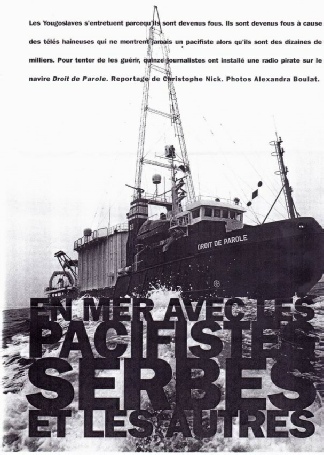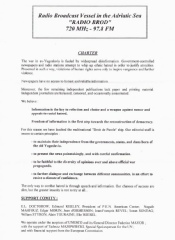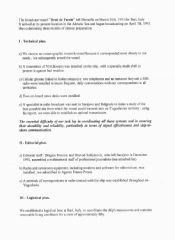© 2014-


Radio Brod - History
In 1991 the former communist state of Yugoslavia began to break up, with separate religious and ethnic factions each laying claim to large areas of territory and population groups. These claims were made despite over 40 years of apparent integration within and between communities and individual families and resulted in a ferocious three-
Serbs, Croats and Muslim forces fought each other for dominance over territory and population, in the process destroying whole towns, villages and thousands of individual lives. Any normal daily way of life ended -
Countless attempts were made to negotiate ceasefires and agree a long term peace solution by re-
In a situation like this readily accepted lines of communication were destroyed along with every other semblance of a 'normal' society and many people felt that news and information was being manipulated to provide biased and unbalanced coverage of what was really happening inside the country.
Against this background a number of journalists from former state radio and television services, as well as newspapers which were no longer able to publish, fled the country and settled in Paris during 1992. One of these, former Montenegran newspaper editor, Dragica Ponorac, set about finding a way of providing his homeland with an impartial source of news and information.
The journalists made contact with a number of French humanitarian and libertarian groups, amongst whom were some people who had been involved with the 'Goddess of Democracy' offshore radio project, which was planned to broadcast to China in 1990.
After discussions between these various groups it was decided that the best means to provide an impartial news and information service was to establish a radio station broadcasting from outside Yugoslavia. The organisation, Droit de Parole (The Right to Speak), was formed in August 1992 and initially negotiated an option to use a land-
Contact was made with Radio Caroline to see if it would be possible to hire the Ross Revenge to use as a base for the proposed station. However, the British authorities who, in November 1990 had impounded the Ross Revenge in Dover, were unwilling to lift the Detention Order on the vessel so the group was forced to look elsewhere for a base.
By early 1993 they had chartered a former Antarctic research vessel, the Cariboo,and she was re-
Programmes were to carry news on the war in Yugoslavia as well as reviews and analysis from the international press and the independent Yugoslavian newspapers which were still being published such as Vreme, Borba, Monitor and Oslobodjenje. The station, whose aim was "to broadcast objective news to all residents of the former Yugoslavia and combat the paranoia which is fuelled by suspicion and propaganda as a weapon of war", also planned to trans mit sports news, family messages and of course music -
mit sports news, family messages and of course music -
Mr Tadcusz Mazowiecki, representing the UN Commission on Human Rights in the former Yugoslavia said the station was desperately needed "to promote actions aimed at freeing information and at halting incitement to hatred on the territory of the former Yugoslavia by the local media."
Backing for the project came from three main sources:-
At the outset in early 1993 the project had also been promised funding by the then French Minister of Humanitarian Action, Bernard Kouchner, but after the French general elections in March 1993 brought a new administration to power that offer was withdrawn. The incoming French administration maintained that the offshore radio project was contrary to international regulations and convention agreements.
Whilst this must have been disappointing for the project's organisers it at least showed a consistency of approach which their predecessors in office had lacked. The previous administration had on many occasions invoked international agreements and regulations in their opposition to Radio Caroline and other offshore radio stations operating in Europe, but apparently had been prepared to help fund the proposed offshore radio operation aimed at Yugoslavia, conveniently ignoring those international agreements.
After being fitted out in the French port of Marseilles the Droit de Parole sailed for the Adriatic on 31st March 1993, carrying a marine crew and seven journalists from all parts of the former Yugoslavia -
Test broadcasts, under the call sign Radio Brod (Radio Boat), started on 7th April 1993 and regular programmes, 24 hours a day, commenced on 1st June 1993. The ship was stationed in international waters in the Adriatic Sea off Bari, Italy but she did not anchor in a fixed position as almost all offshore radio stations in the past had done. Instead, partly for safety reasons, the vessel kept on the move sailing up and down the Adriatic broadcasting to a target area which included Serbia, Montenegro, Dalmatia and Bosnia.
Radio Brod expected its broadcasts to be jammed by the former Yugoslav states and according to radio engineer Jean Pierre Grimaldi, the ship was equipped with electronic countermeasures to deal with such an eventuality.


Click on picture to enlarge

History
Key Dates
Ship and Location
Technical
Staff





The Observer
19th September 1993

Back to Mebo off Libya

Back to Rest of the World Gallery


Back to Radio Brod



Information leaflet explaining the background and operation of Radio Brod.
Click to enlarge